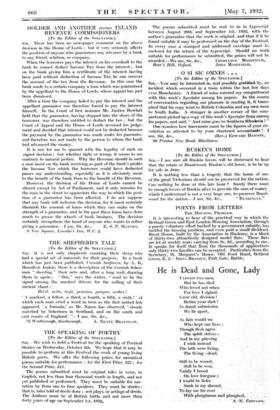HOLDER AND ANOTHER versus INLAND REVENUE COMMISSIONERS [To the Editor
of the SPECTATOR.] - Siu,—There has been no newspaper comment on the above decision in the House of Lords ; but it very seriously affects the position of anyone who guarantees any advance by a bank
to any friend, relation, or company. . . .
When the borrower pays the interest on his overdraft to the bank he cannot deduct Income Tax from the interest ; but on the bank giving him a certificate of the interest having been paid without deduction of Income Tax he can recover the amount of the tax from the Revenue. In this case the bank made to a certain company a loan which was guaranteed by the appellant to the House of Lords, whose appeal has just been dismissed.
After a time the company failed to pay the interest and the appellant guarantor was therefore forced to pay the interest himself. In the Court of first instance Mr. Justice Rowlett held that the guarantor, having stepped into the shoes of the borrower, was therefore entitled to deduct the tax ; but the Court of Appeal and the House of Lords reversed his judge- ment and decided that interest could not be deducted because the payment hy the guarantor was made under his guarantee, and therefore was not made by the person to whom the bank had advanced the money. - It is not for me to quarrel with the legality of such an august deeisiim ; but whether right or wrong, it seems to me contrary to natural justice. Why the Revenue should in such a case insist on the bank receiving as part of the bank's profits the Income Tax which the borrower could have deducted passes my understanding, especially as it is obviously more to the benefit of the bank than to the benefit of the Revenue.
However, the decision of the House of Lords cannot be altered except by Act of Parliament, and it only remains for the imm in the street to appreciate the way in which the posi- tion of a guarantor has been affected. I do not suppose that any bank will welcome the decision, for it must certainly diminish the amount of loans which they can make on the strength of a guarantee, and in the past these loans have done much to grease the wheels of bank business. The decision certainly strengthens the hand of anyone who wants to refuse






































 Previous page
Previous page